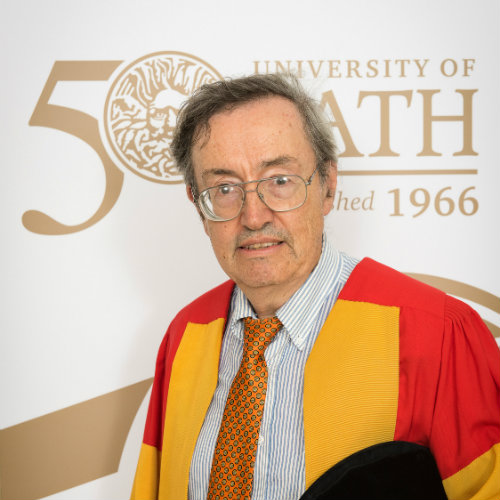Deputy Vice-Chancellor, it is my pleasure to introduce Professor Robert Crabtree, a highly distinguished inorganic chemist who has made seminal contributions to how the structure, bonding and reactivity of many of the metallic elements in the Periodic Table are now viewed.
To people who know him, or indeed perhaps only know of him, he is simply: Bob. Born in London and enthused in inorganic chemistry by two of the giants of the generation (Malcolm Green at Oxford and Joseph Chatt in Sussex), Bob Crabtree completed his Doctorate in 1973, before moving to France for a four-year period to work alongside another giant of the field, Hugh Felkin, at the CNRS near Paris. He then moved to the United States in 1977, taking up a position as assistant professor at Yale University. He has remained there ever since and now hold the post of CP Whitehead Professor of Chemistry.
Bob Crabtree’s contributions to coordination and organometallic chemistry, homogeneous catalysis and, more recently, green chemistry, are simply outstanding. He has co-authored over 600 research papers that have received well over 30000 citations, affording an H-index of 90+. His work has helped propagate the fields of carbon-hydrogen bond activation and catalytic alkene hydrogenation (through particular association with the material named after him, Crabtree’s catalyst), provide an understanding of unusual bonding interactions, particularly in agostic and dihydrogen complexes, elucidate the roles of transition metals in metalloenzyme catalysis and, in recent years, afford new catalysts for the oxidation of water, which is considered as one of the possible solutions to the worldwide issue of energy storage.
His pioneering studies have been recognised with raft of awards and accolades from both universities (Dow Lecturer at Berkeley, Williams Lecturer at Oxford, Osborn (named after another giant of homogeneous catalysis) lecturer in Strasbourg) and societies around the world, including election to the American Academy of Arts and Sciences in 2011 and the award of a Centenary Lectureship from the Royal Society of Chemistry in 2014.
In addition to his research, Bob is also a great educator and teacher. He has singularly authored arguably the definitive textbook on organometallic chemistry, The Organometallic Chemistry of the Transition Metals, now in its 6th Edition, which provides a lucid and detailed overview of the field for undergraduates and postgraduates alike. A few years ago, he was awarded the Yale Postdoctoral Mentoring Prize, based on a nomination from his research group at the time, one of whom who is involved in the organisation of this present conference. He commented that some of Bob’s early words upon arriving in Yale were: “What do you want to do in the future? I need to know as soon as possible, because it is my job to get you there”. Given that this Honorary Degree is being presented during a Meeting of Inorganic Chemistry Recent Appointees, I’m sure that all of the participants at this meeting can appreciate the importance of such a sentiment.
I would like to end by briefly recounting one of my earliest encounters with Bob. At my first international conference as an independent member of faculty, I was about to launch (nervously needless to say) into my oral presentation, when I became aware of the outline of a figure that appeared in the doorway to the darkened lecture theatre. Spotting nowhere obvious to sit, the individual picked up a chair, dragged (may I say somewhat noisily!) it across the stage and proceeded to sit no more than a matter of feet from the by now traumatised presenter. I looked around to see Bob’s enthusiastic face peering at me expectantly waiting for me to get on with it. Inspiring and terrifying at the same time!
Bob Crabtree’s charisma, enthusiasm and attention to detail are known to many of us in this room. He is one of the most creative exponents of this field of inorganic chemistry that all of us here dedicate our time to and it is an honour and a privilege for me to be able to stand here to give this Oration.
Deputy Vice-Chancellor, I present to you Robert Howard Crabtree who is eminently worthy to receive the Degree of Doctor of Science, honoris causa.
Professor Michael Whittlesey Orator
